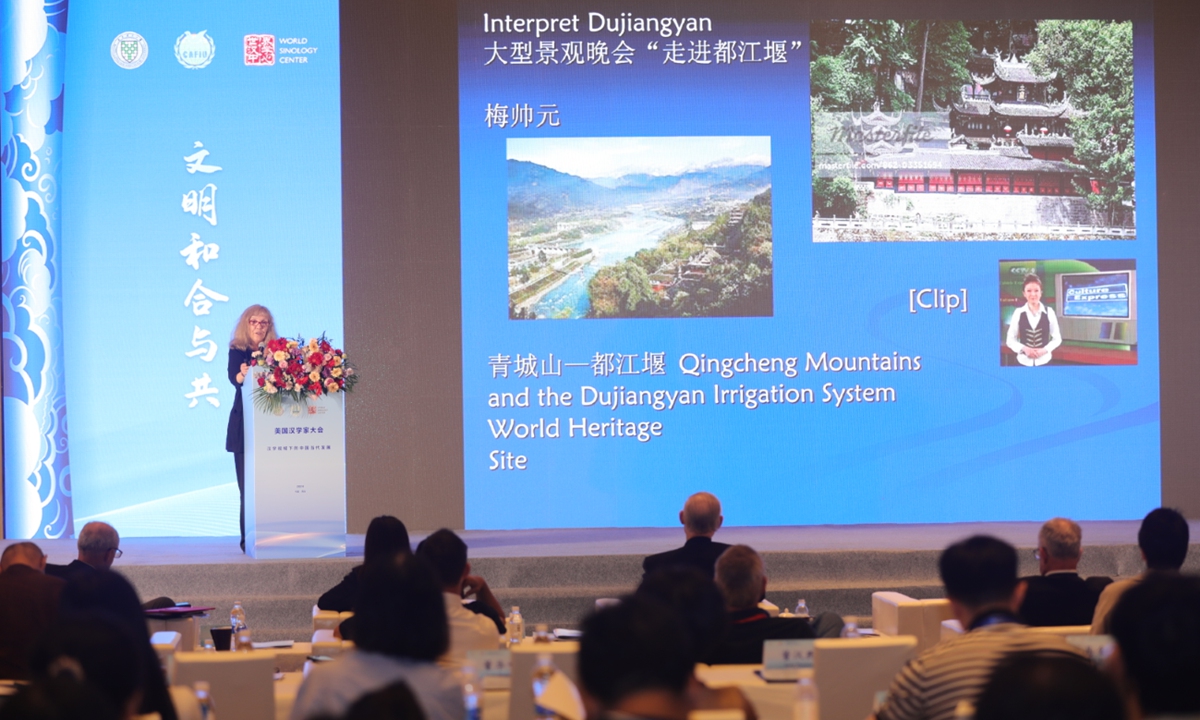There is a deep friendship between US sinologists, the Chinese studies community, China and the Chinese people. They share a wonderful past and an even brighter future. Generation after generation of US sinologists and scholars of Chinese studies, with broad perspectives and open minds, have carried forward the legacy of the pioneers and opened up a new framework for the era of sinology and Chinese studies, noted a scholar at a conference of US sinologists on Monday.
Duan Peng, president of the Beijing Language and Culture University (BLCU), made these remarks at a conference of US sinologists that kicked off in Qingdao, East China’s Shandong Province, on Monday.
Hosted by the World Sinology Center and the Chinese Association for International Understanding, the two-day conference focusing on China’s contemporary development from the perspective of sinology drew more than 100 experts from both China and the US.
As an essential part of the global sinology landscape, US sinological research plays a crucial role in presenting and shaping the image of Chinese-style modern civilization globally, as well as in the innovation and construction of academic systems worldwide.
The inaugural US sinologists’ conference holds profound significance as an important practice in uniting and developing international sinologists who understand and are friendly toward China, promoting China’s outstanding traditional culture and telling China’s story to the world.
Participating experts will explore intersections in sinology and sinological research across themes such as “Research and Dissemination of Ancient Chinese Thought,” “Literary Translation and Research,” “Research on Chinese History and Culture,” “Sinology History and Sinology Education Research,” and “Chinese Politics and Economy,” discussing educational methodologies within these disciplines, creating an open and diverse international academic exchange platform, and jointly promoting the academic development of global sinology and Chinese studies.
“We are coming here today in a challenging world context. As we look around the world, we see the rise of fascist and ethnonationalist political movements, including in many nations that for centuries have been regarded as bastions of democracy and political pluralism,” said Bryan Norden, professor of philosophy at Vassar College and chair professor at the School of Philosophy at Wuhan University, when explaining the significance of the conference “to illustrate the great power and promise of constructive intellectual dialogue.”
“Sinology and Chinese studies are living disciplines. They are not stagnant historical deposits but rather dynamic sources of thought that evolve with the development of the world and the times,” Duan told the Global Times, sharing Norden’s view about the importance of constant academic exchanges between sinologists in China and the world.
Friendship, which derives from close contact between people, holds the key to sound state-to-state relations.
Friendly people-to-people exchanges between China and the US have never ceased. History has fully demonstrated that the peoples of both countries can completely transcend differences in systems, cultures, and languages to establish deep friendships, added Duan.
“I sincerely hope that the successful convening of this conference of US sinologists will build a broader platform for cultural exchanges and cooperation between China and the US, contributing cultural strength to the mutual understanding and affection between the peoples of both countries.”
Western sinology has a history of more than 200 years, during which it has established considerable academic traditions and norms and achieved remarkable scholarly results that are still worth reference and inheritance today, noted Shen Weirong, a history professor at Tsinghua University.
However, Shen noted the old framework of sinology research can no longer comprehensively cover the study of ancient Chinese civilization. Western sinology focuses more on studying China’s classical civilization while neglecting the modern civilizational process and its current development. Therefore, such studies of China are incomplete.
“We must update and revise it in a timely manner to build a new era of Chinese studies that engage in the research of both the ancient civilization and modern development of the entire Chinese nation,” Shen said.













